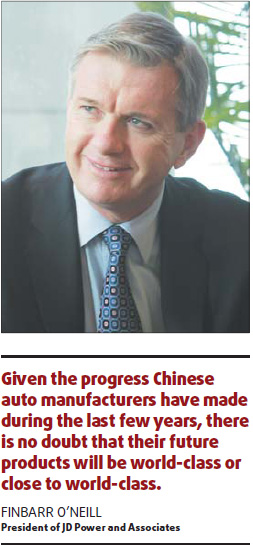

Recent moves toward overseas acquisitions by Chinese automakers have generated heated discussion in China, but foreign researchers simply see the potential trend as a "natural step".
"Given the progress Chinese auto manufacturers have made during the last few years, there is no doubt that their future products will be world-class or close to world-class," says Finbarr O'Neill, president of JD Power and Associates. "It's natural they will enter certain overseas markets."
Acquisitions are often seen as a shortcut to establish distribution channels and break into new markets. Yet if Geely's bid for Volvo is successful - a deal far from complete - O'Neill does not expect Geely would sell its own cars through the Volvo chain, but will continue distributing Volvo, since the brand is so well known.
"An acquisition can be best justified for technology because that can allow the company to leapfrog or gain capabilities in a certain area quickly," he says. "It is more difficult and more challenging when you try to merge cultures and combine distribution channels."
O'Neill notes that the US auto industry has showed no negative reaction to Tengzhong's planned purchase of Hummer from GM. "I am sure that the management at Tengzhong has studied the matter and believes there is an opportunity," says O'Neill.

But a more common reaction is simply wondering if a market for vehicles like the Hummer really exists in China, he says. "As a big vehicle brand though, Hummer is really a niche product."
Rather than focusing on international moves, O'Neill believes it may make more sense for Chinese auto manufacturers to stay in China and maximize their domestic opportunities, especially in the secondary cities and vast rural areas.
Statistics show that there is already on average a car for every eligible adult in the US. In Europe the ratio is two-to-one, while in China it is 40-to-one.
Compared to the big challenge of selling in highly competitive markets with limited growth potential, Chinese companies could find a faster and more economical path to world-class quality by focusing on the domestic consumer, says O'Neill.
"Most likely, we will see some companies take one direction, some take another," he adds.
In O'Neill's view, no matter which direction companies go, the key to sales and profitability is a priority on quality and maintaining a customer-first culture that ensures consumer desires are reflected in products and at retail outlets.
"At the end of the day, it's about product," something O'Neill learned well when he was president and CEO of Hyundai Motor America from 1998 to 2003. "When we talk about competitiveness, we are really talking about the next generation of product," he says.
Under today's pressures from challenges like global warming and oil prices, a worldwide race to develop new energy vehicles is underway, especially in the US, Japan and South Korea. O'Neill expects Chinese companies will also invest heavily in new research. "The question is who will take the lead in this technology in five years," he says.
O'Neill cites a popular saying in the US that "we see some green shoots coming out of the ground".
He predicts that auto sales in the US market will be in the range of 10.3 million units this year and 11.5 million next year. "We do believe the US will recover by 2014 - sales may be 16 million units by then," said him.
But US numbers continue to fall, with September sales tumbling to 745,997 units from 1.26 million units the month previous, mostly due to expiration of the "cash-for-clunkers" policy that ended in August, according to O'Neill.
He believes October will end better, based on information from retailers, stabilization of the overall economy and recovering consumer confidence.
He also predicts that the European market may slide about 7 percent next year as the German government's stimulus runs out. Although sales in Germany this year could surpass 4 million units, they might decline below 3 million next year, which will bring down the overall sales in Western Europe, he explains.
(China Daily 10/26/2009 page6)













